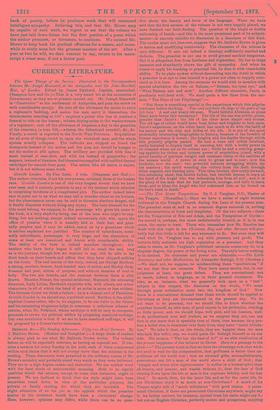Greville Landon. By Pier Lisle. 3 vole. (Chapman and Hall.)—
The author overrates, if not his own powers, certainly those of the human race. Greville Landon is one of the very longest novels that we have ever seen, and it scarcely pretends to any of the interest which attaches to surprising incidents or a complicated plot. The author indeed takes care to point out to us what we may call a thunder-cloud on his horizon, but the phenomenon never can be said to threaten absolute danger, and it finally disperses without doing any injury. The hero himself, for the title must belong, we suppose, to the personage who gives his name to the book, is a very shadowy being, ono of the men who might be any- thing, but are nothing, except indeed enormously rich, who spurn the office of premier when it is humbly laid at their feet, and gene- rally perplex and, it may be added, annoy us by a greatness which is neither explained nor justified. The number of subordinate, nomi- nally subordinate, personages is very large, and the characters of some at least are conceived and drawn with considerable ability. The ability of the book is indeed manifest throughout ; few readers who have fairly begun it will fail to reach the end, long as is the journey, though few, we venture to say, will be able to lay their hands on their hearts and affirm that they have skipped nothing on the route. The real heroes of the story, indeed, are George Berthon, a strong, resolute, honest, hard-headed man of action, and Harley Grey, dreamer and poet, infirm of purpose, and without stamina of soul or body. The two are friends, and the contrast between them is ably drawn. Maurice Fienne, the cynical aristocrat, Maynard, the scheming democrat, Lady Lilian, Berthon's exquisite wife, with others, are minor characters, in all of which the hand of an artist is more or less evident. The German Count we think a failure ; he is a clumsy sort of Peschiera. Greville Landon is, we should say, a political novel. Berthon is the philo- sophical Conservative, who is, we suppose, to be our ruler in the future, and his aurpassing eloquence helps to overcome a nefarious scheme of reform, when Mr. Falkland, whose antitype it will. be easy to recognise, proceeds to crown the political edifice by proposing manhood suffrage. Our own conviction is that if we are to have manhood suffrage, it will be proposed by a Conservative statesman.


































 Previous page
Previous page